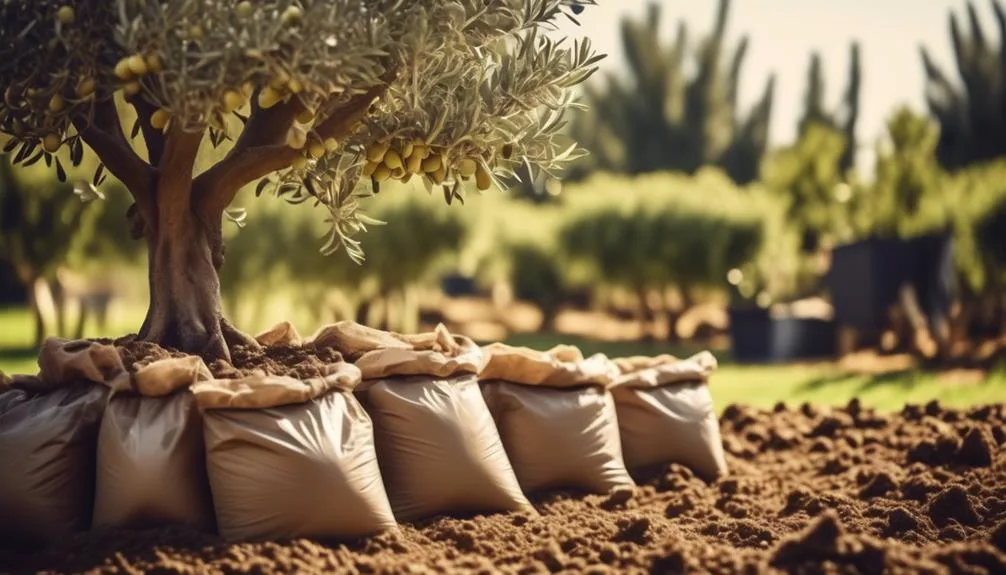Do you want to know the best way to nourish your olive trees naturally? Organic fertilizers are the answer. They support tree health and enrich the soil sustainably.
To grow thriving olive trees, it's important to learn about the best organic fertilizers and how to use them for maximum growth and fruit production.
Let's explore the options, application methods, and best practices for using organic fertilizers on olive trees to promote a bountiful harvest and long-term tree health.
Key Takeaways
- Organic fertilizers promote healthier growth and improve the quality of the olive harvest.
- They increase microbial activity and organic matter content in the soil, improving soil structure, water retention, and nutrient availability.
- Organic fertilizers enhance nutrient absorption, leading to higher fruit quality.
- Using organic fertilizers supports a more sustainable and environmentally friendly approach to olive tree cultivation.
Benefits of Organic Fertilizers for Olive Trees
Using organic fertilizers for your olive trees will promote healthier growth and improve the overall quality of your olive harvest. Organic fertilizers contribute to soil health and sustainability by increasing microbial activity and organic matter content. This leads to improved soil structure, water retention, and nutrient availability, supporting the long-term health of your olive trees and the surrounding ecosystem.
Additionally, organic fertilizers enhance nutrient absorption, ultimately boosting fruit quality. They provide a balanced and slow release of essential nutrients, ensuring that your olive trees receive a steady supply of nourishment throughout the growing season. As a result, the fruits produced are often of higher quality, with better flavor and nutritional value.
Embracing organic fertilizers not only benefits your olive trees but also supports a more sustainable and environmentally friendly approach to cultivation.
Types of Organic Fertilizers for Olive Trees
To further explore the benefits of organic fertilizers for your olive trees, it's important to understand the various types of organic fertilizers available and their specific advantages for promoting healthy growth and enhancing the quality of your olive harvest. When selecting organic fertilizers for your olive trees, it's crucial to consider natural alternatives that contribute to soil health and overall tree vitality. Here are some types of organic fertilizers commonly used for olive trees:
| Type of Organic Fertilizer | Description | Advantages |
|---|---|---|
| Compost | Rich in nutrients, enhances soil structure | Improves soil fertility and water retention |
| Fish Emulsion | High in nitrogen, promotes leaf and shoot growth | Boosts overall tree vigor and productivity |
| Bone Meal | Good source of phosphorus and calcium | Strengthens root development and fruit formation |
Understanding the benefits of these organic fertilizers can help you make informed decisions for the optimal care of your olive trees.
Application Methods for Organic Fertilizers
Considering the type of organic fertilizer and the specific needs of your olive trees, you can apply the fertilizer using various effective methods to ensure optimal nutrient absorption and utilization by the trees.
Before applying organic fertilizers, it's essential to conduct soil testing to identify any nutrient deficiencies. This will help you choose the right fertilizer and determine the appropriate application rate.
Fertilizer placement is crucial for olive trees, and it's recommended to spread the organic fertilizer evenly around the drip line of the tree to ensure that the roots can access the nutrients effectively.
Timing is also important; applying organic fertilizers in early spring allows the trees to benefit from the nutrients during their active growth period.
Best Practices for Using Organic Fertilizers
Discover the most effective techniques for applying organic fertilizers to maximize the health and productivity of your olive trees.
- Composting basics
- Utilize kitchen scraps, yard waste, and manure to create nutrient-rich compost.
- Turn the compost regularly to aerate it and promote decomposition.
By understanding composting basics, you can create your own organic fertilizer, reducing waste and providing essential nutrients to your olive trees.
- Soil health
- Test your soil to determine its pH level and nutrient content.
- Amend the soil with organic matter to improve its structure and water retention.
Improving soil health ensures that your olive trees receive the necessary nutrients to thrive. By following these best practices, you can enhance the effectiveness of organic fertilizers and promote the overall well-being of your olive trees.
Organic Fertilizer Recommendations for Olive Trees
Looking for effective organic fertilizer recommendations for your olive trees? When it comes to promoting soil health and optimizing nutrient absorption for your olive trees, organic fertilizers play a crucial role.
Consider using compost, well-rotted manure, or organic mulch to enhance the overall health of the soil. Compost helps to improve soil structure, retain moisture, and supply essential nutrients.
Well-rotted manure enriches the soil with organic matter, stimulates microbial activity, and supports nutrient cycling.
Organic mulch not only conserves soil moisture and suppresses weed growth but also gradually releases nutrients as it decomposes.
These organic fertilizers not only provide essential nutrients for your olive trees but also contribute to the long-term health and sustainability of your soil, thus promoting optimal nutrient absorption.
Conclusion
To promote healthy and thriving olive trees, consider incorporating organic fertilizers into your care routine. By choosing the right type and applying it correctly, you can improve soil health, increase nutrient uptake, and enhance fruit quality in a sustainable way.
This not only supports the growth and productivity of your trees but also contributes to a healthier environment. Keep your olive trees flourishing for years to come with the benefits of organic fertilizers.

